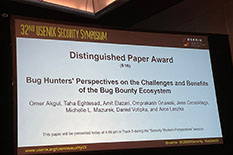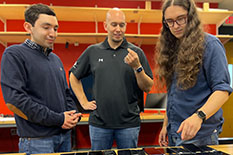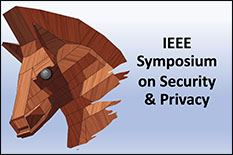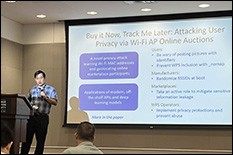News Story
Nourin Awarded Funding to Support Her Work Measuring Censorship in Small Countries
Published August 30, 2023
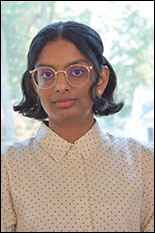
A University of Maryland graduate student in computer science has received substantial financial support in the form of a fellowship and scholarship for her groundbreaking work to measure censorship in smaller countries with repressive regimes and limited internet access.
Sadia Nourin was awarded one of three competitive Pulse Research Fellowships from the Internet Society (out of 82 applications from 35 countries).
She was also named a Metropolitan Washington Chapter Scholar by the Advancing Science in America (ARCS) Foundation, which will provide a $5K scholarship for the upcoming school year.
The funding supports her research in developing novel methods for measuring censorship in places like Turkmenistan, where it is challenging to identify public servers and local vantage points to test content.
Nourin’s interest on this topic began as an undergraduate, and she is continuing her work as a master’s student in the department’s combined BS/MS program.
While most research in this area is focused on large nations with intricate censorship systems such as China, Iran and India, Nourin examines smaller countries with weaker infrastructures that are often overlooked, such as Turkmenistan, Myanmar and Yemen.
She says that current techniques for measuring censorship in large nation states cannot be applied in the same way to countries with limited resources. For example, since only 38% of Turkmenistan’s population has access to the internet, it is challenging to recruit volunteers or find vantage points to conduct these tests remotely at scale.
Using Turkmenistan as their case study, Nourin and her coauthors created the first set of tools to successfully monitor smaller countries’ censorship behaviors comprehensively. Their techniques measure how each IP address inside Turkmenistan is subjected to censorship.
“No other measurement efforts in any other country have achieved such a comprehensive understanding,” says her adviser Dave Levin, an associate professor of computer science with a joint appointment in the University of Maryland Institute for Advanced Computer Studies.
Nourin was inspired to join Levin’s Breakerspace Lab after she attended a presentation on Geneva, an AI system developed by computer science alum Kevin Bock that evolves to evade censorship in large nation states like China. Both Bock and Levin coauthored Nourin’s paper, along with researchers at the University of Chicago, which was presented earlier this year at the ACM Web Conference in Austin, Texas.
With the recent fellowship funding from the Internet Society, Nourin wants to develop a long-term measurement system that goes hand in hand with existing systems to provide insight into these smaller countries.
“It is not an overstatement to say that Sadia’s work will help make the internet a freer and more open place for those living in Turkmenistan and other countries,” says Levin.
—Story by Maria Herd, UMIACS communications group
This story was adapted from an article by the Department of Computer Science

